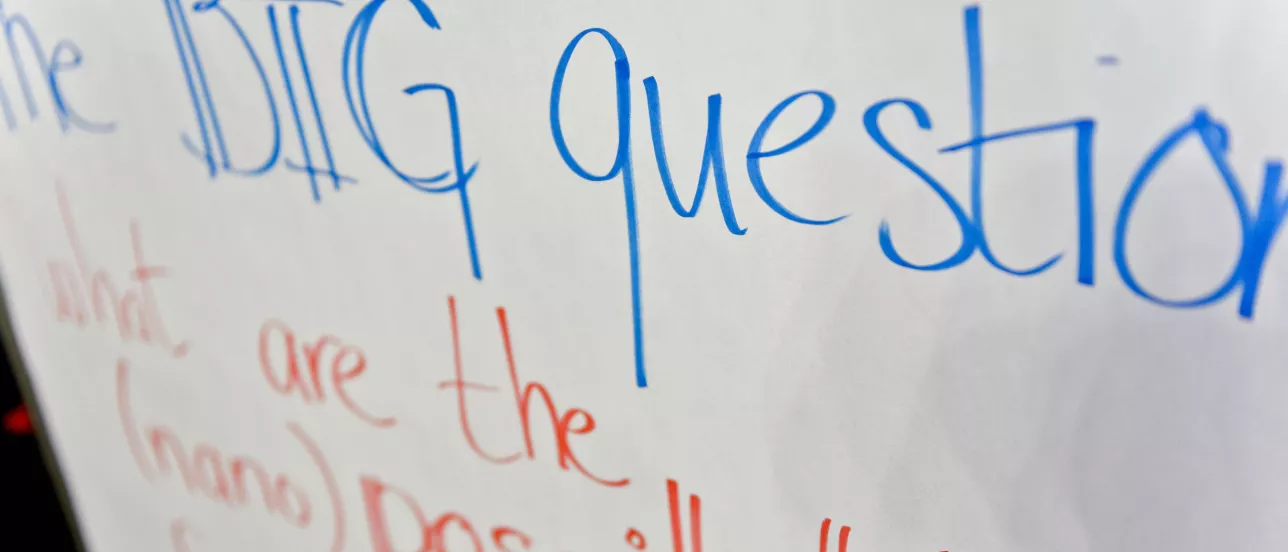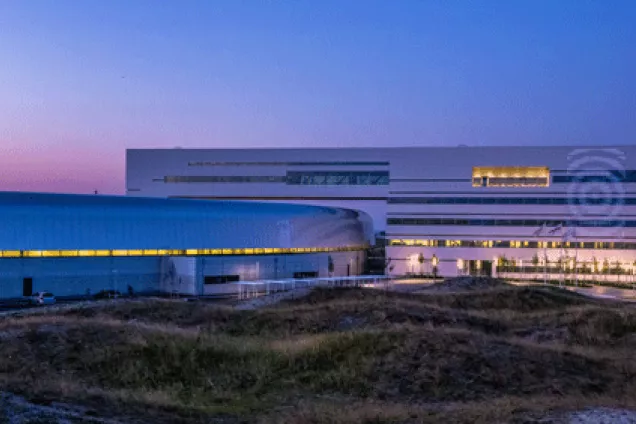Physics, Quantum Science and Technology - Master Programme
Master's programme · 2 years · 120 credits

Description
The programme in quantum information science and technology offers a general physics education with particular focus on the rapidly developing field of quantum science from both a theoretical and experimental perspective.
Understanding quantum theory leads to fundamental insights about the physical world and the fact that quantum systems can be used to manipulate information processing in ways that have no counterpart in classical physics and mainstream technology.
You will study quantum theory, physics' role in information, and its connections to major quantum technologies such as quantum computers, quantum communication, and quantum simulation. Beyond quantum mechanics, the courses cover the quantum theory of light, the theoretical aspects of information carried by quantum systems, lasers, and the physics of several important areas for quantum technology, such as superconductors, nanostructures and atoms.
The programme has strong links to research in the many groups at Lund University working on quantum science and technology, ranging from the foundations of quantum theory to Lund Laser-Lab and Lund Nano-Lab.
Career prospects
This master programme provides a basis for several career paths. It gives you the necessary knowledge-base for pursuing a research education in either theoretical or experimental quantum information science and/or quantum technology. It also provides you with good opportunities for entering the quantum technology industry, which is on the rise both in Sweden, Europe and around the world, with increasingly many companies, both recent and long-established, aiming to develop its applications in computing, information security, simulation, sensing etc. As a graduate of this programme, you are also equipped for jobs in the non-quantum industry, for instance in programming, modeling, and data processing.
Computers in the programme
The programme requires that you have access to a computer, preferably a laptop, on which you can install software mainly provided by the University, such as Microsoft 365, CAD/CAM and development environments for Python, Matlab or other computational tools. It can be either a Windows computer or a MacOS. On some courses you may need to buy or rent your own software.
Conditions in the study environment and during study visits and field studies
The programme contains compulsory elements that require you to be able to work independently and safely in a laboratory environment, in a hospital environment, in workshops, in production facilities, or during study visits and field studies. These elements require the ability to comply with safety regulations and instructions, and to move around in and evacuate premises safely. The elements also require the ability to monitor and control the processes studied.
Closed for applications
Application opportunitiesClosed for applications
Learn more about our application periods and when to apply for studies at Lund University.
Contact
Programme coordinator
Armin Tavakoli
Email: armin [dot] tavakoli [at] teorfys [dot] lu [dot] se
Study advisor
Johanna Nilsson Onsberg
Email: studievagledning [at] fysik [dot] lu [dot] se
Requirements and selection
Entry requirements
Bachelor’s degree of at least 180 credits in physics or the equivalent. The degree must include at least 90 credits in physics.
Proficiency in English equivalent to English 6/B from Swedish upper-secondary school.
Selection criteria
English language requirements
Most of Lund University’s programmes require English Level 6 (unless otherwise stated under 'Entry requirements'). This is the equivalent of an overall IELTS score of 6.5 or a TOEFL score of 90. There are several ways to prove your English language proficiency – check which proof is accepted at the University Admissions in Sweden website. All students must prove they meet English language requirements by the document deadline, in order to be considered for admission.
How to prove your English proficiency – universityadmissions.se
Country-specific requirements
Check if there are any country-specific eligibility rules for you to study Bachelor's or Master's studies in Sweden:
Country-specific requirements for Bachelor's studies – universityadmissions.se
Country-specific requirements for Master's studies – universityadmissions.se
Apply
Start Autumn Semester 2025
Day-time Lund, full time 100%
In English
Study period
1 September 2025 - 6 June 2027
Application
Closed for applications
How to apply
Lund University uses a national application system run by University Admissions in Sweden. It is only possible to apply during the application periods.
Step 1: Apply online
- Check that you meet the entry requirements of the programme or course you are interested in (refer to the section above on this webpage).
- Start your application – go to the University Admissions in Sweden website where you create an account and select programmes/courses during the application period.
Visit the University Admissions in Sweden website - Rank your programme/course choices in order of preference and submit them before the application deadline.
Step 2: Submit documents
- Read about how to document your eligibility and how to submit your documents at the University Admissions in Sweden website. Follow any country-specific document rules for Master's studies or Bachelor's studies
Country-specific requirements for Bachelor's studies – universityadmissions.se
Country-specific requirements for Master's studies – universityadmissions.se
- Get all your documents ready:
- official transcripts and high school diploma (Bachelor's applicants)
- official transcripts and degree certificate or proof that you are in the final year of your Bachelor's (Master's applicants)
- passport/ID (all applicants) and
- proof of English proficiency (all applicants).
- Prepare programme-specific documents if stated in the next paragraph on this webpage.
- Upload or send all required documents to University Admissions before the document deadline.
- Pay the application fee (if applicable – refer to the section below on this webpage) before the document deadline.
* Note that the process is different if you are applying as an exchange student or as a part of a cooperation programme (such as Erasmus+).
* If you have studied your entire Bachelor's programme in Sweden and all of your academic credits are in Ladok, you do not have to submit transcripts or your diploma when applying for a Master's programme. However, there may still be other documents you need to submit! See the link below.
* Svensk student?
Läs instruktionerna om att söka till ett internationellt masterprogram på lu.se
Programme-specific documents
In addition to the documents mentioned under Step 2, you must also submit a 'Summary Sheet' when you apply for this programme.
Summary Sheet for the Master's programmes in Physics (PDF, new window)
Tuition fees
Non-EU/EEA citizens
Full programme/course tuition fee: SEK 340 000
First payment: SEK 85 000
Citizens of a country outside of the European Union (EU), the European Economic Area (EEA) and Switzerland are required to pay tuition fees. You pay one instalment of the tuition fee in advance of each semester.
Tuition fees, payments and exemptions
EU/EEA citizens and Switzerland
There are no tuition fees for citizens of the European Union (EU), the European Economic Area (EEA) and Switzerland.
Application fee
If you are required to pay tuition fees, you are generally also required to pay an application fee of SEK 900 when you apply at the University Admissions in Sweden website. You pay one application fee regardless of how many programmes or courses you apply to.
- Paying your application fee – universityadmissions.se
- Exemptions from paying the application fee – universityadmissions.se
- Convert currency – xe.com
*Note that there are no tuition or application fees for exchange students or doctoral/PhD students, regardless of their nationality.
Scholarships & funding
Lund University Global Scholarship programme
The Lund University Global Scholarship programme is a merit-based and selective scholarship targeted at top academic students from countries outside the EU/EEA.
Lund University Global Scholarship
Within the framework of the Lund University Global Scholarship programme, the University also offers the African Research Universities Alliance (ARUA) Scholarship targeted at top academic students from selected African research universities.
Swedish Institute Scholarships
The Swedish Institute offers scholarships to international students applying for studies in Sweden at Master's level.
Scholarship information on the Swedish Institute website
Country-specific scholarships and funding options
Lund University has agreements with scholarship organisations and funding bodies in different countries, which may allow applicants to apply for funding or scholarships in their home countries for their studies at Lund University.
External scholarships
More information about this Master's

MAX IV and ESS – our world-class research facilities
Learn more at maxiv.lu.se